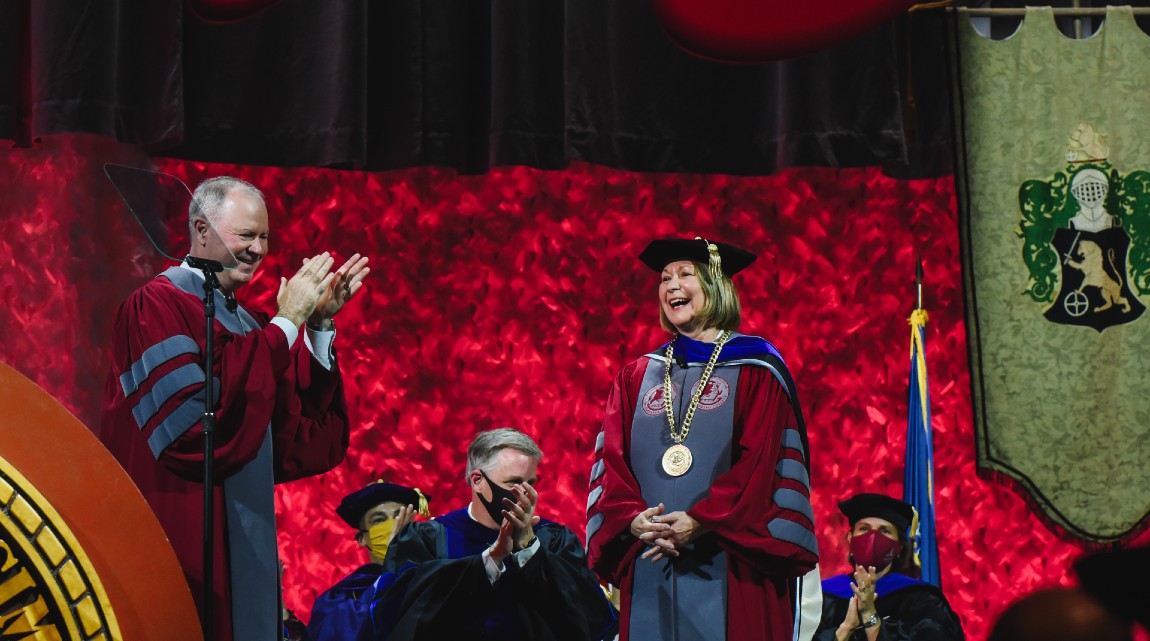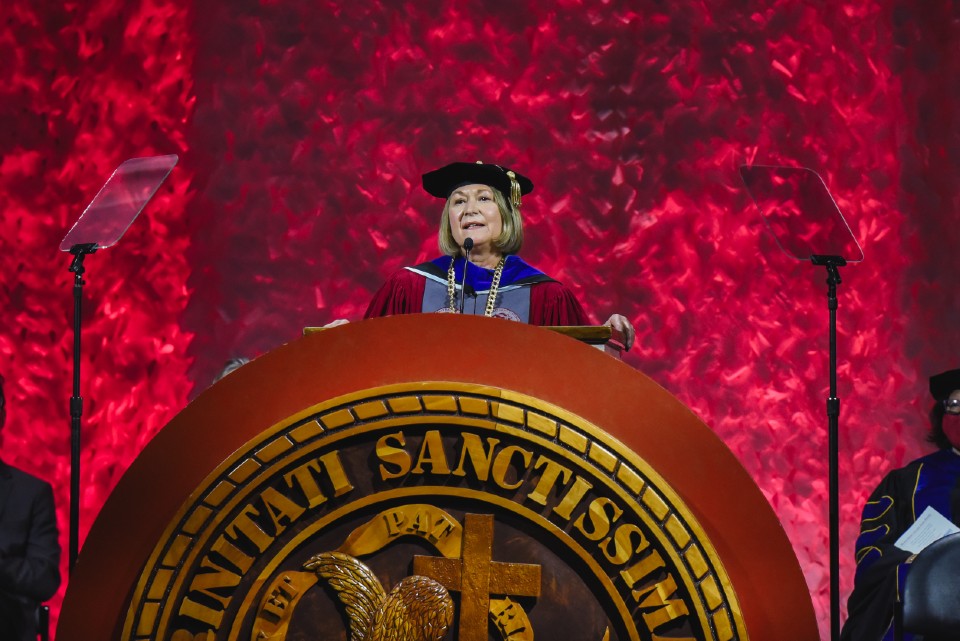Muhlenberg Inaugurates Its 13th President, Kathleen Harring
In a ceremony held in Memorial Hall on Friday, November 12, Harring shared her vision for the future of the College.By: Meghan Kita Saturday, November 13, 2021 06:40 AM
 President Kathleen Harring smiles at the standing ovation she receives after her investiture by Board of Trustees Chair Richard C. Crist Jr. ’77 P’05 P’09. Images by Kristi Morris, Littlewing Photography.
President Kathleen Harring smiles at the standing ovation she receives after her investiture by Board of Trustees Chair Richard C. Crist Jr. ’77 P’05 P’09. Images by Kristi Morris, Littlewing Photography.Almost a year and a half after the Board of Trustees named Kathleen Harring the 13th president of Muhlenberg College in June 2020, the celebration of her inauguration was finally able to take place yesterday in Memorial Hall. After Board of Trustees Chair Richard Crist Jr. ’77 P’05 P’09 opened the proceedings, five local politicians (including Harring’s former student State Representative Mike Schlossberg ’05) were the first individuals to address the audience. U.S. Representative Susan Wild was the last elected official to speak, and when she welcomed those in attendance to the inauguration of the College’s first woman president, applause interrupted her comments and echoed throughout the space.
The historic nature of Harring’s appointment was one of the common themes in the 11 greetings that preceded Harring’s introduction and investiture. Another was her dedication to the institution and to the liberal arts. She joined the College as a faculty member in the Department of Psychology in 1984 and served as department chair for 12 years before becoming an administrator. She was provost before she began her role as president in an interim capacity in June 2019.
Another theme was the extraordinary nature of Harring’s tenure so far: “Even in the best of times, taking on the critical leadership role of college president is daunting. It typically requires belief and courage to move an organization to the next level,” said Dean of Admissions and Financial Aid Melissa Falk ’92. “With the added complexity and demand of a global pandemic, President Harring has proven her presidential mettle and demonstrated her courage by successfully leading the College during a pandemic all while maintaining our core values of the health and wellness of our community.”
Introducing Harring was Jay Lemons P’14, the president of Academic Search, Inc. and emeritus president of Susquehanna University. Crist conducted the installation of the president, placing the College’s presidential medallion around her neck. Harring received a standing ovation before addressing the crowd.

She began by thanking her family, the day’s speakers and the attendees and acknowledging the women who paved the way for her to be the first female president of the College, including Clara Lane, the first Black student who enrolled in 1926 in a teaching certificate program; members of the first class of women who began as first-year students in 1957; and the first female provost, Marjorie Hass, who created the associate dean position in assessment and academic planning that was Harring’s first administrative appointment.
“These women, and many others, boldly and confidently blazed the trail for me,” Harring said. “I am indebted to them for leading the way with courage and conviction.”
She went on to describe her own educational journey, which began at a small, liberal arts institution, and her deep belief that a liberal arts education equips its graduates to solve “wicked problems.”
“‘Wicked problems’ is a term formally coined by design theorists Horst Rittel and Melvin Webber in 1973 to highlight differences between technological and scientific problems and social policy problems. Developing a COVID vaccine is a scientific problem. Getting shots in arms? That is a wicked problem,” she said. “Wicked problems require knowledge and skills across disciplines. They present ongoing challenges, often have ambiguous causes and evolving consequences. Wicked problems involve multiple stakeholders with varying levels of power, all existing within an interdependent universe.”
She reflected on the richness of the Muhlenberg community and recognized some of its members for their commitment to solving “wicked problems.” She shared that these types of individuals are the rule and not the exception, that she is routinely encountering examples of the transformative power of the College’s liberal arts education on students and on alumni.
She then presented her vision for her time as president: “To make sure that a Muhlenberg education remains critically relevant to our students. To make sure that we recruit and support outstanding faculty. To make sure that we continually re-create the liberal arts for each generation that walks the paths of our beautiful campus.”
“How do we do that?” she continued. “We invest in our strengths—talented students, passionate professors who are exceptional scholars and mentors, and a community of care and compassion. We explore innovative and creative ways to re-invent the student experience. Ways that deeply value and centralize diversity—diversity of background, diversity of context and diversity of viewpoint. Because when you learn, work and play with people who are different from yourself, you deepen your capacity to understand the complexity of those wicked problems.”
About Muhlenberg College
Founded in 1848, Muhlenberg is a highly selective, private liberal arts college offering baccalaureate and graduate programs. With an enrollment of nearly 2,000 students, Muhlenberg College is dedicated to shaping creative, compassionate, collaborative leaders through rigorous academic programs in the arts, humanities, natural sciences and social sciences; selected preprofessional programs, including accounting, business, education and public health; and progressive workforce-focused post-baccalaureate certificates and master’s degrees. Located in Allentown, Pennsylvania, approximately 90 miles west of New York City, Muhlenberg is a member of the Centennial Conference, competing in 23 varsity sports. Muhlenberg is affiliated with the Evangelical Lutheran Church in America.
